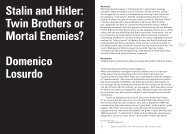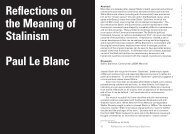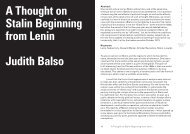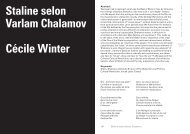adrian
adrian
adrian
- No tags were found...
You also want an ePaper? Increase the reach of your titles
YUMPU automatically turns print PDFs into web optimized ePapers that Google loves.
Pippin’s reconstruction of the Kant-Hegel relationship, my highlightingof Hegel’s interweaving of simultaneous references to both Bacon andKant in the “Reason” section of the Phenomenology (an interweavingwith respect to which Pippin remains silent) hopefully drives home thepoint that the Pippinian brand of deflationary Hegelianism is a highlyselective revision of Hegel’s actual philosophy, one replacing absolutewith subjective idealism wholesale (here, my verdict on Pippin agreeswith that pronounced by Houlgate, 93 although Houlgate and I eachreach this shared judgment by different exegetical and argumentativeroutes). Taking the “absolute” out of absolute idealism and ignoringthe absolute idealist dialectical-speculative sublation of subjectivistone-sidedness (i.e., sidelining and neglecting both Hegel’s critiqueof Kantian transcendentalism as subjective idealism as well as his1807 elevation of Bacon over Kant apropos the metaphysics of activesubjective agency) certainly allows for a creative reconstruction ofHegel as, for the most part, a good Kantian. But, simply put, this is notHegel. Especially considering the weight of the evidence I already haveprovided for this critical contention vis-à-vis Pippin—this evidence isdrawn mainly from textual moments prior to Pippin’s favorite passageon the transcendental unity of apperception from “The Doctrine of theConcept” in the Science of Logic—additional testimony drawn fromtextual moments subsequent to Pippin’s key piece of evidence for hisKantianizing interpretation further substantiates my counter-claimsagainst this interpretation. As the immediately ensuing will show,Hegel himself would reject the post-Kantian anti-realism Pippin triesto attribute to him. Hegel’s somewhat pro-Bacon, anti-Kant account ofReason breaks with Kant’s subjectivism, resting as this subjectivismdoes on speculatively-dialectically untenable dualisms of a sub-rational(als Vernunft) Verstand-type supporting anti-materialist, anti-naturalistperspectives alien to both Bacon’s and Hegel’s idealisms.As in the Science of Logic, Hegel, in the prefatory treatment ofKantian critical philosophy in the Encyclopedia Logic, also pronouncesa few approving words with respect to the transcendental unity ofapperception. 94 But, once again, as soon as he voices this sympathy hesignificantly qualifies it, immediately adding with respect to Kant’s pureapperceiving “I”:CRISIS&CRITIQUE#3Now this certainly expresses correctly the nature of allconsciousness (die Natur alles Bewußtseins). What humanbeings strive (Streben) for in general is cognition of the world;we strive to appropriate it and to conquer it (sie sich anzueignenund zu unterwerfen). To this end the reality of the world (dieRealität der Welt) must be crushed (zerquetscht) as it were; i.e.,it must be made ideal (idealisiert). At the same time, however, itmust be remarked that it is not the subjective activity of selfconsciousnessthat introduces absolute unity into the multiplicityin question; rather, this identity is the Absolute, genuinenessitself (Zugleich ist dann aber zu bemerken, daß es nicht diesubjektive Tätigkeit des Selbstbewußtseins ist, welche dieabsolute Einheit in die Mannigfaltigkeit hineinbringt. DiesesIdentität ist vielmehr das Absolute, das Wahrhafte selbst). Thusit is the goodness of the Absolute (die Güte des Absoluten), soto speak, that lets singular [beings] (Einzelheiten) enjoy theirown selves (Selbstgenuß), and it is just this that drives themback into absolute unity (treibt sie in die absolute Einheit zurück). 95To begin with, both here and in his other invocations of thetranscendental unity of apperception (ones quoted by me earlier),Hegel, contra Pippin’s subjectivist anti-realism, implies that theabsolute idealist (as also realist) sublated version of this Kantianprinciple involves positing that “the reality of the world,” as alreadyunified and formed in itself (“it is not the subjective activity of selfconsciousnessthat introduces absolute unity into the multiplicity inquestion”), objectively pre-exists the synthesizing/unifying activitiesof subjectivity. That is to say, if this real world is “appropriated,”“conquered,” “crushed,” and “idealized,” it must already be there, as apre/non-subjective presence, to be submitted to these “strivings” of theapperceiving, (self-)conscious subject. 96 When Pippin himself quotesthe above passage from the Encyclopedia in support of his Kantian antirealistversion of Hegel, he ignores this directly implied preexistence ofan asubjective real as unified/formed in and of itself. 97Furthermore, in the preceding block quotation from theCRISIS&CRITIQUE#395 Hegel 1970b, §42 (p. 118); Hegel 1991c, §42 (p. 85).93 Houlgate 2006, pp. 139-143.96 Hegel 2002b, pp. 116, 118-120; Lukács 1978, p. 9.94 Hegel 1991c, §42 (pp. 84-85).97 Pippin 1993, pp. 290-291.396 “Where to Start?: Robert Pippin, Slavoj Žižek...397“Where to Start?: Robert Pippin, Slavoj Žižek...






